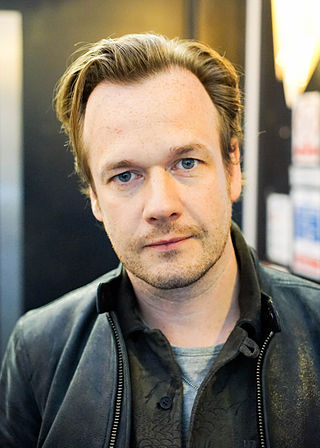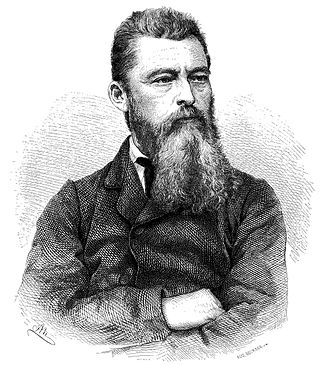Post-theism is the belief that the belief in a god belongs to a previous stage of human development and, thus, a division of theism vs. atheism is obsolete. It is a variant of nontheism. The term appears in liberal Christianity and post-Christianity.
Frank Hugh Foster in a 1918 lecture announced that modern culture had arrived at a "post-theistic stage" in which humanity has taken possession of the powers of agency and creativity that had formerly been projected upon God. [1]
Denys Turner argues that Karl Marx did not choose atheism over theism but rejected the binary Feuerbachian choice in The Essence of Christianity altogether, a position which by being post-theistic is at the same time necessarily post-atheistic. [2] At one point, Marx argued "there should be less trifling with the label 'atheism'", as he insisted "religion in itself is without content, it owes its being not to heaven but to the earth, and with the abolition of distorted reality, of which it is the theory, it will collapse of itself." [3]
Related ideas include Friedrich Nietzsche's pronouncement that "God is dead" and the transtheism of Paul Tillich or Pema Chödrön.
Theism is broadly defined as the belief in the existence of at least one deity. In common parlance, or when contrasted with deism, the term often describes the philosophical conception of God that is found in classical theism—or conception found in monotheism—or gods found in polytheistic religions—or a belief in God or gods without the rejection of revelation as is characteristic of deism.
Irreligion is the absence or rejection of religious beliefs or practices. It encompasses a wide range of viewpoints drawn from various philosophical and intellectual perspectives, including atheism, agnosticism, skepticism, rationalism, and secularism. These perspectives can vary, with individuals who identify as irreligious holding a diverse array of specific beliefs about religion or its role in their lives.

Paul Johannes Tillich was a German-American Christian existentialist philosopher, Christian socialist, and Lutheran theologian who was one of the most influential theologians of the twentieth century. Tillich taught at German universities before immigrating to the United States in 1933, where he taught at Union Theological Seminary, Harvard University, and the University of Chicago.
Nontheism or non-theism is a range of both religious and non-religious attitudes characterized by the absence of espoused belief in the existence of God or gods. Nontheism has generally been used to describe apathy or silence towards the subject of gods and differs from atheism, or active disbelief in any gods. It has been used as an umbrella term for summarizing various distinct and even mutually exclusive positions, such as agnosticism, ignosticism, ietsism, skepticism, pantheism, pandeism, transtheism, atheism, and apatheism. It is in use in the fields of Christian apologetics and general liberal theology.
The existence of God is a subject of debate in the philosophy of religion. A wide variety of arguments for and against the existence of God can be categorized as logical, empirical, metaphysical, subjective or scientific. In philosophical terms, the question of the existence of God involves the disciplines of epistemology and ontology and the theory of value.
"God is dead" is a statement made by the German philosopher Friedrich Nietzsche. The first instance of this statement in Nietzsche's writings is in his 1882 The Gay Science, where it appears three times. The phrase also appears at the beginning of Nietzsche's Thus Spoke Zarathustra.
Jewish atheism refers to the atheism of people who are ethnically and culturally Jewish. Contrary to popular belief, the term "Jewish atheism" is not a contradiction because Jewish identity encompasses not only religious components, but also ethnic and cultural ones. Jewish law's emphasis on descent through the mother means that even religiously conservative Orthodox Jewish authorities would accept an atheist born to a Jewish mother as fully Jewish.
Atheism is the rejection of an assertion that a deity exists. In a narrower sense, hard atheism is specifically the position that there are no deities, effectively taking the stance of a positive claim in regards to the existence of any goddess or god. The English term 'atheist' was used at least as early as the sixteenth century and atheistic ideas and their influence have a longer history.
Criticism of atheism is criticism of the concepts, validity, or impact of atheism, including associated political and social implications. Criticisms include positions based on the history of science, philosophical and logical criticisms, findings in both the natural and social sciences, theistic apologetic arguments, arguments pertaining to ethics and morality, the effects of atheism on the individual, or the assumptions that underpin atheism.

Peter Rollins is a Northern Irish writer, public speaker, philosopher, producer and theologian.
Death of God theology refers to a range of ideas by various theologians and philosophers that try to account for the rise of secularity and abandonment of traditional beliefs in God. They posit that God has either ceased to exist or in some way accounted for such a belief.
Secular theology is a term applied to theological positions influenced by humanism and secularism, rejecting supernatural metaphysical positions related to the nature of God. Secular theology can accommodate a belief in God, like many nature religions, but as residing in this world and not separately from it.
Christian atheism is an ideology that embraces the teachings, narratives, symbols, practices, or communities associated with Christianity without accepting the literal existence of God.
Atheism, in the broadest sense, is an absence of belief in the existence of deities. Less broadly, atheism is a rejection of the belief that any deities exist. In an even narrower sense, atheism is specifically the position that there are no deities. Atheism is contrasted with theism, which in its most general form is the belief that at least one deity exists.
In the philosophy of religion and theology, post-monotheism is a term covering a range of different meanings that nonetheless share concern for the status of faith and religious experience in the modern or post-modern era. There is no one originator for the term. Rather, it has independently appeared in the writings of several intellectuals on the Internet and in print. Its most notable use has been in the poetry of Arab Israeli author Nidaa Khoury, and as a label for a "new sensibility" or theological approach proposed by the Islamic historian Christopher Schwartz.
Postchristianity is the situation in which Christianity is no longer the dominant civil religion of a society but has gradually assumed values, culture, and worldviews that are not necessarily Christian. Post-Christian tends to refer to the loss of Christianity's monopoly in historically Christian societies to atheism or secularism. It does not include formerly Christian-majority societies such as present-day region of Turkey and the Balkans that now follow other religions such as Islam.
Agnostic atheism or atheistic agnosticism is a philosophical position that encompasses both atheism and agnosticism. Agnostic atheists are atheistic because they do not hold a belief in the existence of any deity and are agnostic because they claim that the existence of a divine entity or entities is either unknowable in principle or currently unknown in fact.
Atheistic existentialism is a kind of existentialism which strongly diverged from the Christian existential works of Søren Kierkegaard and developed within the context of an atheistic world view. The philosophies of Søren Kierkegaard and Friedrich Nietzsche provided existentialism's theoretical foundation in the 19th century, although their differing views on religion proved essential to the development of alternate types of existentialism. Atheistic existentialism was formally recognized after the 1943 publication of Being and Nothingness by Jean-Paul Sartre and Sartre later explicitly alluded to it in Existentialism is a Humanism in 1946.
Marxist–Leninist atheism, also known as Marxist–Leninist scientific atheism, is the antireligious element of Marxism–Leninism. Based upon a dialectical-materialist understanding of humanity's place in nature, Marxist–Leninist atheism proposes that religion is the opium of the people; thus, Marxism–Leninism advocates atheism, rather than religious belief.

Ludwig Andreas von Feuerbach was a German anthropologist and philosopher, best known for his book The Essence of Christianity, which provided a critique of Christianity that strongly influenced generations of later thinkers, including Charles Darwin, Karl Marx, Sigmund Freud, Friedrich Engels, Mikhail Bakunin, Richard Wagner, and Friedrich Nietzsche.